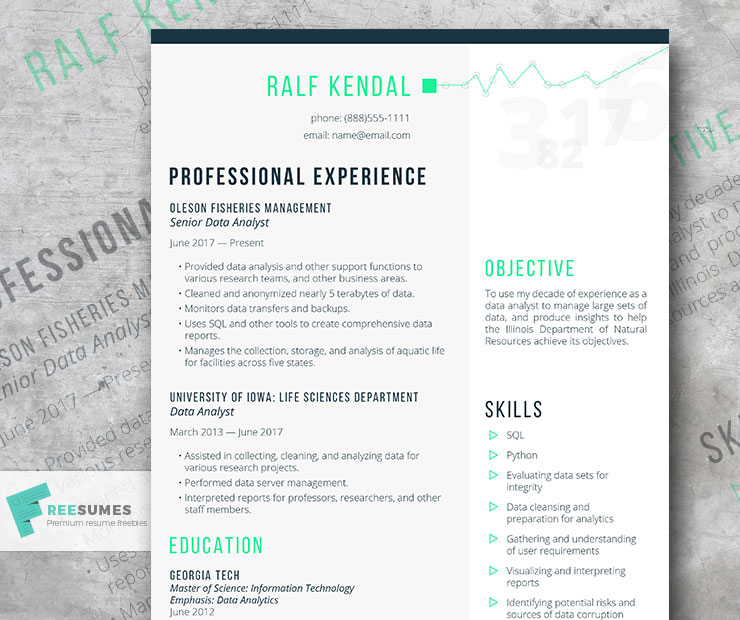According to the Bureau of Labor Statistics, the demand for computer research engineers (including data analysts) is projected to grow 11% by 2024, faster than the average for all occupations. Thanks to the explosion of big data over the past several years, it is easy to see why. Companies have access to more information than ever. Now, they need your skills to interpret that data for them and turn it into actionable insights!
If you have a background in mathematics, statistics, or analysis, getting a job as a data analyst can be a nice progression on your career path. What’s even better — it will likely come with a nice salary increase!
But to land that sweet new job, you’ll need to file an amazing resume. We are here to help with some great tips and a superb data analyst resume sample.
Resume Template for Data Analyst (Word)

Download resume example (.docx)
Data Analyst Resume Example (text version)
Professional Objective
To use my decade of experience as a data analyst to manage large sets of data, and produce insights to help the Illinois Department of Natural Resources achieve its objectives.
Skills
- SQL
- Python
- Evaluating data sets for integrity
- Data cleansing and preparation for analytics
- Gathering and understanding of user requirements
- Visualizing and interpreting reports
- Identifying potential risks and sources of data corruption
Professional Experience
Oleson Fisheries Management
Senior Data Analyst
June 2017 — Present
- Provided data analysis and other support functions to various research teams, and other business areas.
- Cleaned and anonymized nearly 5 terabytes of data.
- Monitors data transfers and backups.
- Uses SQL and other tools to create comprehensive data reports.
- Manages the collection, storage, and analysis of aquatic life for facilities across five states.
University of Iowa: Life Sciences Department
Data Analyst
March 2013 – June 2017
- Assisted in collecting, cleaning, and analyzing data for various research projects.
- Performed data server management.
- Interpreted reports for professors, researchers, and other staff members.
Education
Georgia Tech
Master of Science: Information Technology
Emphasis: Data Analytics
June 2012
Davis University
Bachelor of Science: Computer Information Systems
January 2008
Know How to Open Your Resume
Generally, resumes begin with either a summary of qualifications/professional summary or a resume objective statement. For data analysts, there are compelling reasons to use both.
With an objective statement, you can tailor your resume to directly address the requirements of the position, the company culture, and what you see as a realistic career path with that firm. With a summary of qualifications, you can steer the focus to your best capabilities and accomplishments. Placing both atop of your resume will capture the readers’ attention.
Choose Stand-Out Keywords
The technical skills you focus on are some of the most important keywords you will use on your resume. Still, there are other ‘power words’ to add as well. Use some of the following data analyst relevant keywords in your resume text. Not only will they impress your potential employer, but doing so will also help your resume get past any applicant tracking software that may be in place.
- Interpret
- Monitor
- Record
- Track
- Analyze
- Present
- Validate
- Verify
- Data Modeling
- Statistics
- Business Analysis
- Data Visualization
- SQL
- Machine Learning
Quantify Your Accomplishments
When you work with numbers and data, you should be able to use the same to provide proof of your accomplishments. Otherwise, the statements you make will be largely unsupported and sound generic.
While you may not be able to assign a specific figure to each claim you include, it is important to quantify at least some of them. Here are some examples:
- Implemented quality control measures that improved data reliability by 22%.
- Led a team in analyzing 18 months of marketing data in order to extract useful customer insights.
- Sourced publicly available data sets to increase available demographic information by 75%.
- Interpreted CRM and support ticket data to provide actionable information that customer service teams used to improve support metrics by 20%.
- Responsible for the successful completion of a project that added 25 data servers.
- Reduced information backlog by 15%.
Show That You Understand How Business Uses Data
Data analysts often become involved in some pretty high-level stuff. However, unless you are applying for a job in academics, you’ll want to keep things down to earth. To do this, show that you understand how data analysis can be used to meet business needs.
You can do this by listing responsibilities such as requirements gathering. Also, describe projects you worked on to provide context for your skills and experience. Show how you are using your combo of digital and analytical skills to empower business leaders with relevant insights for decision-making.
Final Thoughts: Link to Your LinkedIn Profile
Your resume should include a link to your LinkedIn profile. There, hiring managers will be able to learn more about you and your career accomplishments. Also, if you have shared samples of your work on platforms such as GitHub, consider linking to those as well. This information could serve to provide proof of your capabilities.






